Today, I wanted to discuss rumors that Russia may be gearing up for a large new mobilization of troops. I think this is a possibility, but I’ll go through each point for and against the idea.
Firstly, the rumors stem from a couple random posts like this one:
There is a large web of corroborating information that we’ll try to sort through and make sense out of.
Firstly, let’s state that many observers have been calling for Russia to do a new mobilization for a very long time, but with quite contradictory approaches. People like Strelkov, in the same breath, derided Russia for not being able to ‘adequately provide’ arms, armor, ammo, equipment, etc., to the current batch of troops, yet at the same time called for “one million men” to be immediately mobilized. How do you accoutre one million men when you’re struggling to do so for 300k+?
Let’s also state the reminder that the current conflict represents the largest mobilization of manpower Russia has ever experienced since WW2. In every previous conflict going back to Afghanistan, Russia has utilized at most around 110k simultaneous troops at any given time, and in most of them far less—around 70-80k for the Chechen wars, Georgia 2008, etc.
So when they called up 300k reservists last year, this represented a historic challenge to the Russian state’s administrative mechanisms. There were many problems, but just as many on-the-fly solutions which were constantly remedying issues. Russia adapted with incredible agility to these unprecedented demands, such that the current army one year later barely resembles that of last year.
This is all to say that most people who don’t understand logistics can’t even fathom the gargantuan task of outfitting an army of that size from scratch. Over time, it became evident that one of the main reasons that the mobilization itself was the size that it was, and why no further mobilization was carried out, was due to Russia’s inability to properly equip anything larger. Sure, there were tons of legacy Soviet stockpiles of equipment, but it takes a large amount of time to get it out of mothballs.
However, as Putin and Shoigu diligently launched the productive industries into over-drive and a semi-war-footing, Russian supplies began to catch up to the demand, albeit in uneven fashion, as can be expected. This brings us to the present where whispers have begun to form that Russia is now producing so much that expanding operations could soon be viable.
I first reported the above in one of the recent reports, a comment made by Andrei Gurulev, state Duma deputy and a respected ex-general of the Russian armed forces. He said, basically, that should production continue increasing at the current pace, it will be able to equip another mobilized army. I’ll quote him again here to have everything in one concise place:
A new partial mobilization is possible with an increase in industrial turnover in Russia. This condition was called by a member of the State Duma Committee on Defense, Lieutenant General Andrey Gurulev
:"Partial mobilization comes from completely different parameters. From the ability of our industry to provide the group that is currently performing combat tasks. Today, our industry is able to provide the grouping that is on its own. If something is more than that, then it will be considered, " he said.
There are several sudden initiatives that appear to underline his statements and give weight to the growing argument that Russia may soon be ready. The most notable have been the statements issued by another two key Russian figures, the first of which is Andrey Kartapolov. He’s a high ranking member of the defense sector, now serving as chairman of the defense committee in the state Duma and is also an ex-general himself, who had previously commanded the Western Military District amongst other formations.
In this new video, he’s arguing for the Duma to pass a new bill which raises the conscription age from 18-27 to 18-30:
A few things to note about this.
Firstly, what he’s saying is, there were efforts by other legislators to include provisions in the bill for giving various exemptions for people to get out of conscription. For instance, people who have a dependent child with a disability, as well as for fathers with three or more minor children.
What concerned everyone was his urgent statement that this bill was written for a much larger war which is already ‘on the air’, so to speak. There are many interpretations of this, with some assuming he’s referring to a wider Ukrainian escalation. But it’s clear he’s referring to the more long term potential for a war with NATO which inches closer each day, as evidenced by the recent Polish developments, etc.
The issue is confusing at first glance, because he’s referring to conscription not ‘mobilization’ in terms of what happened in September 2022. How it works in Russia is that anyone aged 18-27 has to serve their compulsory one year of service, but you get deferments for being in school, grad school, etc. So if you finish grad school at age 25, you still have to serve because you’re under 27. This new bill is changing the limit to 30.
But the compulsory conscript service has nothing to do with mobilization for Ukraine, directly speaking. The way it’s connected is that in Russia, anyone who’s served as a conscript automatically gets put on the ‘reserves’ list. The mobilization pool is taken from the reserves. However, the 300k mobilized last year during the official ‘partial mobilization’ specifically chose people from the pool who already had previous combat experience or were ex-contract soldiers (who served under contract and retired or simply left after the contract expiration, etc.).
The reason for this is because, since almost every male in Russia ends up on the reserves list, there is a giant pool of 25 million reservists. And to mobilize 300k from that, they don’t need to tap into all the ones who merely served the 1 year compulsory conscription but had no further experience beyond that. There were plenty other reservists who had much more experience and willingness, and those were the ones called up.
So at first glance, Kartapolov’s bill doesn’t appear related to mobilization but rather annual conscription. However, the way it’s related is that it creates a larger conscription pool which further creates a larger trained reserves in general, from which future members can be mobilized.
Little known is the fact that Kartapolov addressed and clarified his comments in an interview days later:
Quesion: - Andrey Valerievich, the Internet is actively discussing your words about yesterday's amendments — when you said that they were "written for a big war, and this war already smells like". Please explain what was meant?
Answer: - What was meant was that we now have to provide for, let's say, an unfavorable scenario for the development of the situation. We see how the collective West is actively rearming, starting to deploy the military industry. These are some of the factors that indicate their preparation for a big war. And even if this is not the case, we still have to respond to these potential threats. That is, we are talking about preventive measures. Because if we ignore all these alarm signals — we may end up with a new year in 1941.
He’s then asked directly whether a new Russian mobilization will take place. He says that currently, there is no need. Note that he specifically says “I emphasize TODAY…” which basically means “at the moment there’s no need” and leaves obvious room for a mobilization in the future:
- No, today — I emphasize, today-in this, if we proceed from the needs of the SVO, there is no need. But we must, as I said above, be prepared for any possible scenario. And also-let's not forget that the Law "On Mobilization and mobilization training" was not written for a special military operation or for any operation or military campaign in principle. It was generally accepted in 1997! And we adjust it to improve the system of military registration and conscription in principle, and not with an eye to any events, past or future. This is exactly what yesterday's amendments were aimed at.
Recall that prior to last year’s September ‘partial mobilization’ there were likely similar statements from officials that no mobilization was needed, etc. So such statements should be taken with a grain of salt. The general rule in politics is you never announce a major controversial initiative until the necessary last moment.
Another state Duma rep and ex-general Victor Sobolev has stated the following as well regarding the new changes:
You get the sense that a lot of the top military statesmen are tightening the ship for what they expect to be a future mobilization. Adjacently, Sobolev has also stated the following:
This tightening includes a travel ban on future mobilized troops who are given an official summons notice so that people can’t ‘draft dodge’ and skip out to Georgia and such:
"️Travel ban: what you need to know
The State Duma Committee approved a travel ban for everyone whose name is in the register of summonses.
– The ban begins to take effect from the moment your name appears in the unified register of summonses. They promise to launch the registry by October.
– The appearance of the agenda on public services is not the agenda itself. This is a notification that your name has appeared in the registry.
– Earlier there was a clause in the law: the ban on departure came into force only 7 days after the name appeared in the register. Now the ban will be in effect immediately: you don't have seven days.
– The unified register of summonses is not only about conscripts. There, the summons are placed for everyone – both those who are called for mobilization, and for urgent.
– All laws and amendments are being edited with the amendment "In case of mobilization". So we are thinking about what kind of occasion they are preparing for.
– The list of prohibitions also mentioned a ban on driving. There are no changes in this paragraph yet (but they may be made).
Recall that when Putin held his roundtable with frontline correspondents, he made a comment about mobilization as well as retaking Kiev and appeared to dismiss it for the time being with the same panache that seemed to indicate a potential future need.
Now, let’s look at some other clues. Firstly, Wagner has potentially been removed from the conflict, which would theoretically be a big blow for Russia. These were reportedly upwards of 50k of some of the best trained and motivated troops. There are still disputes about how many of them actually ended up signing a contract with the MOD, but some claim the number is fairly low compared to the overall.
If my calculations of Russia’s troop totals are right, then losing another 50k men would be a pretty consequential outcome. Sure, for now their replacements in Bakhmut appear to be holding—just barely, in the view of some. But two problems:
Those troops now holding Bakhmut and its peripheries could have been strengthening the lines elsewhere, preventing retreats in Zaporozhye for instance, or helping offensives in Kharkov
Wagner was meant to have continued pushing on toward Chasov Yar and Kramatorsk, which now is a vector completely off the table as the thin replacement troops can only barely hold on defensively
Keep in mind, we still don’t know for certain if Wagner is gone for good from Ukrainian territory, but as of now it seems so. This represents a large loss that needs to be made up somehow, which further supports the mobilization theory.
The second big factor is that, as Gurulev had stated, Russia is now increasing its production to a level that could potentially support much more troops. This is undersigned by Shoigu’s timely and significant visit to North Korea this week, which marks the first foreign state visit to NK at all since the pandemic began. For this, North Korea pulled out all the stops:
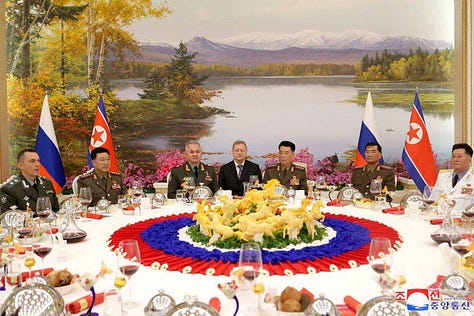



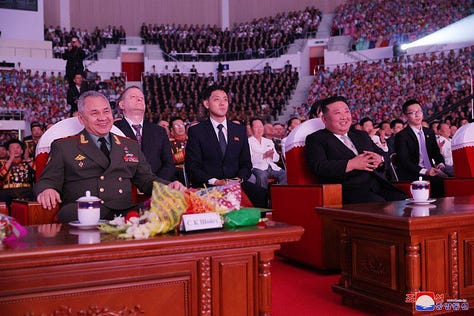

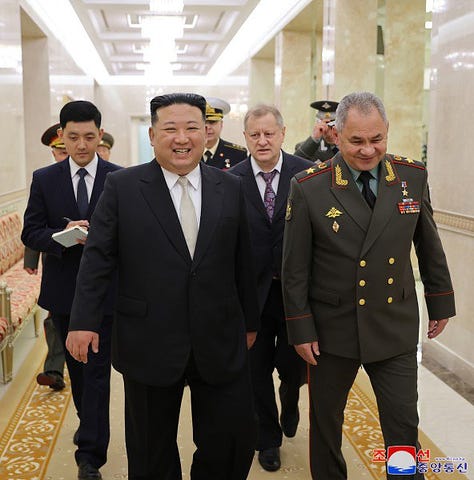
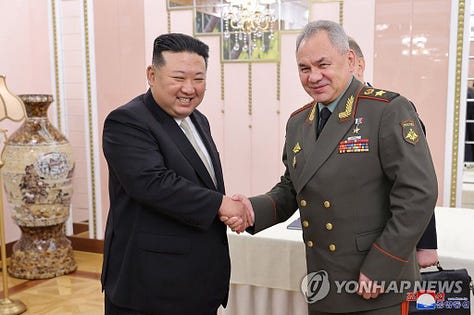
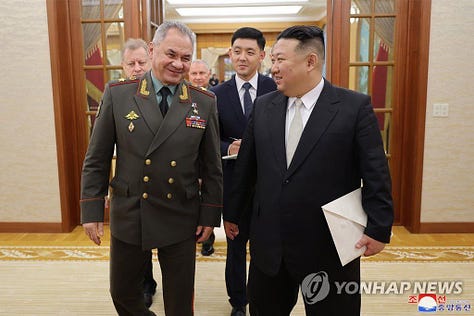
There are now more and more indications that this visit in fact revolves around signing major new arms deals, as North Korea is a big manufacturer of most of the needed common shell types, like 122mm, 152mm, etc.
Listen below to another retired Russian colonel and military journalist Mikhail Khodaryonok explaining what Shoigu is likely making deals for in North Korea:
So, could this timely visit happen to coincide with a planned force buildup? Why else would Russia recruit the arms manufacturing powerhouse of North Korea at this particular time?
The other big thing to look at is the potential timeline. You see, Russia holds two large annual conscription call-ups in spring and fall. These are for the regular compulsory conscripts to serve their one year mandatory training. The spring call-up runs from April 1 to July 15, and the fall from October 1 to December 31. These typically call up about 140,000 troops each and take up a large amount of Russia’s armed forces’ administrative capability.
This logically means that a new mobilization would not happen anywhere around these dates because it would present too big of an administrative strain to call up and process 120,000 conscripts at the same time as separately processing another 300-500k mobilized reservists.
Last year, they mostly avoided the timeline by announcing the partial mobilization in late September, which ran to the end of October. For this, the fall conscript call-up actually had to be moved to begin at November 1. Ideally, they wouldn’t have done this, but if you’ll recall, last year’s mobilization was partly an emergency measure which resulted from the ongoing Kherson/Kharkov front collapses. Kherson happened a bit later in November, but Russian military leaders clearly knew well in advance about the decision to withdraw from the region, which was planned and even telegraphed by Surovikin months ahead of time when he made statements about “difficult decisions in the future” in regard to Kherson.
What I’m saying is that, ideally, they probably would have mobilized at a period even further removed from the conscript call-up, but they sort of had no choice last year. This time, there’s no urgency per se—not in the same sense of an emergency development and a dire lack of troops which faced being overrun. This time, a new mobilization is not about patching up emergency holes, but rather would theoretically revolve around the decision to put the final authoritative stamp on the conflict by finishing it quickly.
Thus, this time they likely have more leeway as to when. The ideal time would presumably be at the exact equidistant period between the two annual conscript call-ups. Like I said, one runs from April-July, the other from October-December. Logically, somewhere in August appears to be the midway point, give or take.
But there’s a catch, which some readers have aptly pointed out. The Russian presidential elections are coming up in March of 2024. That’s fairly soon, and it’s arguable that Putin does not want an ongoing mass mobilization happening right on the eve of campaign season, for the reason that a potentially not-so-popular mobilization call could give ammo to opponents to actively use against Putin during the campaign. “Why would you elect the guy who’s calling up hundreds of thousands of you to the slaughter”—or something to that extent.
On the other hand, to carry out a mobilization after Putin has already cinched the presidency for the next six years seems to make most logical sense. What further supports this possibility is the fact that even the new bill being discussed in the earlier Kartapolov video does not take effect until January 1, 2024. So all those new conscription changes are really for the future, from 2024 onward. Does this mean that Russia is slowly preparing the groundwork for a potential mid-2024 mobilization?
Recall that the annual spring conscription will begin in April 2024, so they can’t do a mobilization at that time. Nor would they do it prior, as the presidential election is in March, so that’s definitely out. Thus, summer of 2024 would be the only other logical choice.
Keep in mind though, mobilized troops take a hefty amount of time to train. Those called up in summer of 2024 may not be ready until late 2024 or even the spring campaigns of 2025. If Russia does not want to prolong things that long, then a mobilization this year would make more sense. That way, they can prepare the newly mobilized for the spring campaigns of 2024 and could potentially cinch the war by the end of next year.
Allow me to cover a few last pertinent points. One other angle to view this from, when judging the plausibility of a new mobilization, is from the events that occurred last month. It’s clear that the Wagner rebellion led to a lot of internal changes in the Russian MOD, in the way of their approach to the war and the seriousness with which they treat developments. It can be said that perhaps the rebellion ‘spooked’ them to the extent that it made them see that prolonging the conflict could give more and more chance for instability and dissatisfaction to grow amongst the troops, which could lead to even bigger rebellions and perhaps entire coups down the line.
As we all know, many troops shared some of Prigozhin’s concerns and complaints, particularly in regard to various lacks in the army—particularly ammo droughts, etc. It’s possible that the MOD has decided to not risk further dissatisfaction around constant shortages, which obviously include personnel shortages in key areas where troops require reinforcements as well as rotation, and thus may decide to end the issues ‘once and for all’ by mobilizing a large new contingent which will allow for solving a lot of the personnel issues, particularly in regard to rotation, which has become a new problem cropping up recently on the Zaporozhye line, according to complaints from soldiers on the front who are forced to withstand repeated Ukrainian meat assaults.
The Kremlin/MOD may have seen things come a little too close to ‘unraveling’ for their comfort, and decided to go all out in finishing the war. This is likely wishful thinking to the extent that statements from officials continue to mostly tote the line that everything is plentiful and troop numbers are as they should be. And this may very well be true, because remember—there is an ongoing stealth mobilization which is reportedly gathering an enormous 40k sign-ups per month.
The problem with that is, no one knows the composition of those signups. There are generally two types of people that can walk into a recruitment office and sign up: ex-military who now want to ‘volunteer’ their services or brand new enlistments. An enlistment is a person walking off the street who may have no experience whatsoever. This type of person would require the maximum amount of training, which means this segment of the sign-ups would not be ready for a very long time. That said, theoretically in Russia there should be very few males who’ve had no training since there’s a compulsory conscription which gives them a mandatory 1 year. And those who are so averse to service that they utilized various tricks and exemptions to get out of serving would likely not be the types now ‘signing up’ off the street, anyway. In the end, though, we know the vast majority of the stealth mobilized thus far have been put into Shoigu’s new ‘reserve armies’ and will therefore not be available for the frontline, at least for now. I believe the specific figure given last month was something like: out of the ~160k, 40k of them will be sent to the front while the remainder is for the reserve armies.
Let me just say that I don’t want to characterize the previous idea in too negative a light: i.e. the Kremlin is only considering a new mobilization because it’s scared of being overthrown, or something like that—there is more to it. For instance, Putin has clearly shown an increasing initiative in recent months of truly getting a full picture of the front’s needs, including a concern for complaints of any deficiencies from the troops themselves. He’s done this not only by visiting the zone but also through the aforementioned correspondents’ roundtable, where not only did he receive specific requests from individual troops themselves, but Putin even instructed the correspondents to keep in touch and update him on particular issues from the front.
Thus, if a new mobilization were to be called, we can assume that this initiative was one of the chief spurs, as it allowed Putin to truly understand the troops’ needs and perhaps helped open his eyes to what needs to be done.
The other biggest issue of course surrounds the large developments of a wider war, as demonstrated by the recent press conference between Putin and Lukashenko I recently covered. The fact that Putin made such a high level and candid acknowledgement for the first time of the possibility of Polish incursion and the potential for the conflict to spiral out of control with NATO’s involvement, means that Putin may very well be considering escalating in order to speed up the conflict’s resolution so as to give NATO less of a chance of developing it into something much larger.
On the same tack, Putin may want to mobilize as a deterrence: The speed of the resolution could be a welcome byproduct of that, but the chief impetus could be to simply enlarge the Russian active armed forces by such an amount as to give NATO second thoughts about any devious plans they may potentially be hatching. If Russia mobilized another 500k and had a massive 900k force at the ready, I highly doubt Poland or NATO for that matter would be willing to try their luck with any type of escalation or provocation.
But, if it were so easy, it would already have been done. Some might wonder, if that’s all it takes to avert WW3, why hasn’t Russia done it already? Recall the earlier arguments: Russia is hardly able to equip the current force, much less a force double or even triple the size.
Some readers have had good arguments on this account. For instance, that much of the newly mobilized could simply be lightly armed forces used for rotations or in similar manner to Ukraine’s TDF (Territorial Defense Forces). Also, you don’t need as much armor to hold defensive positions, as mechanized forces are typically used for assaults. You can hold vast frontlines with guys in trenches without a large amount of IFVs and tanks, just ATGMs, air support, FPV/loitering drones, etc.
That being said, Russia prefers to always use active defense. One of the reasons is that in this conflict, a passive defense gets you killed because it allows the enemy to just ‘tee off’ on you from range with their own drones, etc., which can tear trench fortifications apart. Only active defense keeps enemies on their toes and their offensive initiative disrupted to the point where your 1st and 2nd echelon trench guys are not under a constant untenable attack. And for active defense you really need good amounts of mobile light armor, at the least. In short: if you’re not using active defense in this conflict you’re a sitting duck because static trench positions are too easy to fix and then continually bombard until total destruction. You have to constantly throw off the enemy and keep them discombobulated with small counter-attacks and position changes.
Because of that, I don’t think it would work to mobilize a bunch of lightly armed men if you don’t have the artillery barrels and armor to give them. So the answer will rely on how much Russia’s vaunted production up-scales are really pumping out, and whether it’s enough to accoutre another huge force.
Lastly, I wanted to share some related material to give a little context to these possibilities and segue into the next topic.
I had mentioned that Putin may hold off on mobilization in runup to the election for fear it could be used against him by any potential opponents. That’s not to say that I believe a new mobilization would be hugely unpopular. No, in fact to the contrary, one of the main theses behind why I think mobilization is now possible is because for the first time, I believe societal solidarity exists to the extent that people would mostly back a mobilization call, at least to a larger extent than before.
The reason is that over a year of vile attacks against Russia and Russians has now transpired, and each day brings new outrages that have revealed the true face of the West. In my view, Russians increasingly feel a moral justification for the SMO’s completion and for Russia’s victory over the West in general. So to me, now is the perfect time. But let me just say that, I don’t actually believe it will happen. This article is merely making arguments for and against the possibility. Ultimately, I hold that there’s maybe a 20-30% chance it could happen this year as I think Russia has enough to continue annihilating the AFU attritionally, it just may not be enough to gain an appreciable offensive initiative, apart from key areas where force concentrations can be created, like currently in the Kharkov region.
But if Shoigu’s got enough for his reserve armies and continues the stealth mobilization at 40k sign-ups per month for the rest of the year, then an official new mobilization would not be needed. At that rate, by next spring, Russia could have as much as an additional ~400k troops if you multiply 40k monthly sign-ups x 9+ months. So it all depends if the ongoing stealth mobilization continues.
But let’s move on and test the earlier thesis about society’s acceptance for a new mobilization, as well as look at a few other interesting things.
A series of polls was conducted in Russia, asking ~2000 or so respondents for their opinions on a variety of issues. Keep in mind, I believe the organization behind the surveys leans Ukrainian, so there could be some measure of subtle bias in the way it was carried out. But the results are still very interesting.
Let’s start with our very topic. How do Russians feel about a potential second wave of mobilization?
As you can see, a reported 54% of people would rather that Russia basically accept a ceasefire instead of carrying out a mobilization, with 35% being for it.
However, this particular poll skewed heavily with females being against and males being for the mobilization, not surprisingly. However, since males represent the vast majority of mobilized, to some extent the female opinion on this is not that relevant. That’s because we can reframe the survey to say: ‘from the actual people who themselves would be mobilized, do they support it?’ To which the answer would be, yes the majority of MALES actually support mobilization.
Here’s the corresponding chart:
Red is for ‘support mobilization’ and blue is ‘for negotiations’.
As you can see, women skew the support for negotiations so high that they ultimately skew the whole chart. But from the pool of actual people who matter to the mobilization, they prefer to hold mobilizations. Another way of explaining it is that if a mobilization occurred, it’s men’s outrage which matters most given that they’re the ones being sent away. And here we see that men support mobilization (red).
You can see it broken down by age group below:
This is combined men/women. But since we know women skew the ‘pro negotiations’ results particularly, that means the 18-29 group with that huge outsize blue graph tells us that basically, the people most against mobilization and for negotiations are young (probably liberal) women. This comes as no big surprise.
Let me just say that, this may contradict my earlier statement that I believe Russian society is ready for a new round of mobilization. What I meant by that is that I believe they’re far more amenable to it than they would have been at any time prior—but that doesn’t mean they’re still wildly ecstatic about the idea.
Secondly, the poll questions their favorability toward the mobilization in isolation. Sure, in that sense, i.e. in a totally abstract and ideal sense, they may not totally support it. However, you’ll also see that they are overwhelmingly supportive of Putin and anything he decides to do, which means that if he were to call for mobilization, I believe the majority of people would back him.
Now, here’s a survey which simply asks whether Russia should continue the SMO in general or move to peace talks, without any ‘mobilization’ complication.
Here, we see a divide, but slightly more in favor of continuing the SMO. Once again though, women skew very high toward ‘peace talks’.
Here, 35% of respondents say they would cancel the SMO if they could go back in time, while 49% do not regret the SMO having started.
However, if Putin were to sign a peace treaty tomorrow, a total of 73% would support it while 20% would be against:
Keep in mind though, this pretty much tracks with Putin’s approval rating in general, so it could likely represent people who support Putin simply supporting anything he does, which is actually echoed in other survey questions.
For instance, again here 73% of people believe Russia is currently moving in the right direction:
And 69% believe that the SMO strengthens Russia and its position in the world:
58% also believe that the SMO is successful, while 21% believe it’s unsuccessful thus far:
The breakdown of this last question by month is interesting. It shows an understandable dip in the optimism from 61% to 50% during late last year when Russia made all the retreats from Kherson and Kharkov. But since then, it has been steadily rising again to 56 and now 58%:
This one shows the vast majority of Russians disagreeing with the use of nuclear weapons in the SMO:
Here, 39% believe Russia should go on the offensive, while 30% believe it should ‘hold positions’, while 12% believe it should withdraw troops entirely:
Regarding the upcoming election, who would the Russian people vote for:
The autotranslate messed up a couple. In 4th place “Bulk” should be Navalny. Interestingly, Shoigu is not only near the top 10 potentials for president, dispelling theories that he’s ‘widely hated’ by Russians, but Stalin is preferred as president over Medvedev. Prigozhin came in at #2. However, this particular survey was conducted in May, before the Wagner rebellion. As we’ll see below, Prigozhin’s popularity took a big hit after that.
By the way, interestingly, those who did not vote for Putin above—you’ll never guess their chief complaint about him:
If you can disregard the bad autotranslation, you’ll see his perceived “softness” is his most unpopular characteristic.
This will unfortunately miff Western propagandists who believe that, as long as they can ‘get rid of Putin’, Russian society will be made to ‘see the light’ and will come around to ‘peace’. In fact, most of Russian society is likely more maximalist than him at this point.
Now, as for the Wagner rebellion and its aftermath, the following set of polls are enlightening:
On the day of the rebellion, June 24th, 21% of Russian society ‘supported’ Prigozhin’s actions while 42% did not support them:
This is the only one I’ve posted before; it shows an overwhelming 72% happy with how the conflict between Wagner and the MOD was resolved:
But the ones who were dissatisfied give their reasons for being so. Notably, 21% felt Prigozhin should have been brought to justice:
A small minority wanted Prigozhin to go “all the way” and presumably overthrow the MOD.
And here’s the clincher. How did the Russian people’s opinions change about the leading figures of the saga? Surprisingly, Putin had a net increase of 5% in his popularity from the saga. Shoigu did take a big hit with a 5% improvement but 33% disapproval. But Prigozhin took the biggest hit of all:
And more to the point, whose side did Russian people take, Prigozhin or Shoigu?
On June 16-19, days prior to the rebellion, Prigozhin enjoyed a whopping 45% support with 12% supporting the Russian MOD/Shoigu in the ongoing squabble. But after the rebellion, a massive shift occurred: 41% now supported Shoigu and the MOD with 20% supporting Prigozhin.
This further destroys the narrative of the 2D bloggers and 6th column propagandists who claim the people rallied behind Prigozhin exclusively. This is false.
And even more to the point, early this year 41% supported Prigozhin, and on the eve of the rebellion that had swelled to 55% on account of his charisma campaign and months of perceived victories in Bakhmut. But after the rebellion, it had dropped to 29% support with a massive increase to 39% in negative feeling toward him:
Lastly, an overwhelming 69% of Russians feel that Prigozhin would not be able to carry out a coup even if he tried:
And an even more overwhelming 73% believe that an armed coup in Russia is not possible at all, while 18% think it a possibility:
I’d personally love to see a series of surveys of this kind on the Strelkov situation. Though he’s a much more peripheral figure that I’d wager the majority of Russians either aren’t even familiar with or have no real opinion on.
And by the way, on the topic of Strelkov—it’s not exactly intersecting with the earlier subjects, but Prigozhin, Strelkov, and the like are roughly adjacent, so excuse the digression but it’s something I meant to express a while back when Strelkov was first arrested, but forgot to.
I was reminded by this excellent write up from another analyst channel ‘Adekvat Z’. In short, the writer brings up a very good point, which is that most people seem to take it as a given that anyone who’s a ‘patriot’ must inherently be on the good side and should be supported. For some reason, no matter how toxic a form of patriotism some people take, it’s treated as some inviolable thing which is beyond criticism.
But one thing we must recognize, is that there is such a thing as ‘turbopatriots’ and the even more insidious breed of ‘schizopatriots’. These are jingoistic hucksters which mostly exercise a form of toxic agitation under the feigned guise of ‘healthy patriotism’. It’s akin to concern-trolling, perhaps a related classification. It can get to a point where it becomes a mental illness, a sort of sickness which begins to do more harm than good, particularly when the individual becomes a serial antagonizer who has created a following around a certain type of chronic complaining that they can no longer back out, lest they completely invalidate their earlier arguments and the persona they’ve built around this ‘shtick’. It’s the classic sunk cost fallacy.
People like Strelkov start out with good intentions and perhaps legitimate concerns, but over time they seem to become obsessed with proving a point, no matter how consistently wrong their takes have become. It slowly transforms into a situation where they’re left cherry-picking small instances which happen to conveniently support their increasingly implausible agenda, as in the case of Strelkov where he became so twisted he was forced to begin relying on outright kookery to keep up appearances of “something being wrong” in Russia, like claiming Putin is a clone, not real, etc.
My suspicion is that most of these people suffer from severe megalomania and narcissism to the point where, even once their narrative gets completely destroyed, they’re unable to ever admit being wrong, and so they must continue doubling down. But since there is increasingly less points to cherry-pick in their favor, they’re forced to confabulate progressively more phony and unhinged conspiracy theories, going further and further out on a limb so as to put off ever having to admit being wrong.
Strelkov is just the most prominent recent example of this, but in actuality it’s meant to describe a lot of commentators and wannabe ‘analysts’ on our side, who you’ll recognize in the words below, which I found described this phenomenon much better than even I could:
The arrest of Girkin is a good opportunity to look at schizopatriotism as a phenomenon.
Identifying a schizopatriot is not difficult - he is always overflowing with hatred. Toward the state that does not share his desires to become evil, repressive and bloodthirsty. Toward the people who see him as nothing more than a rabid hamster. Towards other schizopatriots who disagree with him even in the slightest.
The foundation of this lies in a complete lack of self-worth, an ego inflated to messianic proportions, hysteria as a primary form of interaction with reality, ignorance, which gives rise to an extremely simplistic worldview, and boundless radicalism as the inevitable escape out of these premises. It is this radicalism that leads to seeking simplistic solutions to all complex issues, which is the trademark of a schizo-patriot.
Mobilize the whole country. All able-bodied people must work twelve hours a day at the machine. Concentration camps for the dissenters, mass executions for the enemies. Nuclear strike on Washington, raze the regime in Kiev, stop all exports to our enemies. Nationalize everything larger than small business, drop the interest rate to zero, put the oligarchs, the government and the Central Bank in front of a people's tribunal. All this sounds familiar, doesn't it?
In the path of all these extreme ideas stands the existing government. Therefore, any schizo-patriot knows that it must be overthrown, seized, and replaced with a revolutionary dictatorship. Those who are cowardly suggest it subtly, while the more foolish and audacious do so openly.
In order to have the slightest hope of achieving this, one has to lie a lot, first of all about the army and the command. And not simply to lie, but by all available means to disperse panic and defeatist attitudes (the same Girkin prophesied back in winter how the Khokhols would seize Kuban and Sochi by the end of their offensive). They think that the people will fill their eyes with blood and rush to organize a Revolution of carnage and chaos. Of course, it is just a coincidence that this matches with the only hope the enemy has to win this war.
If you have a hunch that this applies to a majority of the war-bloggers, I assure you, it's not just a hunch. If you are also worried about the bunch of Khokhols who have crossed into Russia, aptly dubbed False Russians by some people, and who are openly wishing to recreate the Maidan hog farm in our country, you are not wrong. These three groups heavily intersect with each other.
During peacetime, schizo-patriots were complete outcasts, deserving no attention beyond "leave them alone, they won't stink." But during war, they significantly expanded their audience. People have a great need for explanations and understanding of events, so the effect of "he who puts on a white coat becomes a doctor" is not surprising.
Even in these circumstances, the state showed remarkable leniency towards schizo-patriots and their propaganda until the Prigozhin mutiny happened. It was raised under slogans that any schizo-patriot would readily endorse, and the most fanatical ones signed up almost in real-time.
The mutiny was prevented from fully developing, largely due to its lack of a social base. But it was then that they decided to pay close attention to the usual suspects to identify the next flare-up.
Navalny was tolerated for a very long time, but when the time came, his organizational structures were crushed almost overnight. Now it seems that the time is coming for the other flank. While we can only speculate for now, we can confidently state this as a fact once the next arrest occurs on charges of extremism.
If such an arrest occurs, it'll likely be someone who currently expresses solidarity with Girkin. They find it hard not to envision his fate for themselves, and each of them knows very well what they will have to answer for when their turn comes.
As for the detainee himself, I believe there will be more charges in his sentence than those made yesterday, and far more counts. He tried hard. Diligently.
https://t.me/politadequate
The one thing I’ll add, is that schizopatriots are quite adept at exploiting the small fissures to turn them into large craters in the eyes of the gullible or uninformed. They’re masters of finding actual systemic issues, which may be real but fixable, and certainly not gravely intractable problems—in fact in most cases, they’re already fixed or in the process of being so at the time of the schizopatriot’s antagonism—and they fixate on these to grow a mountain out of a mole hill. They turn up the dial to exaggerate the problem into something unimaginably large, which threatens to overturn the whole order, or crash the entire country.
In times of high stress, disarray, and the confusion intrinsic to a major conflict like the SMO, their false exaggerations read as frighteningly true because they play to our most fundamental instincts of fear and worry. These people are like psychological vampires who know how to manipulate their uninformed flock.
The problem is, one thing I noticed about the conflict which was eye opening to me, is that since the early days of 2014, this conflict has attracted a certain stripe of people which can only be described as utopian idealists, even romantics. Take Strelkov as an example, he’s clearly the dreamer archetype—he spent his early life playing at war re-enactment, constructing a romantic fantasy around himself. He became a monarchist who idealized the Tsars and wanted Russia to revert back to the Empire days.
In the early days of the conflict, there were many such characters in the DPR. Several early Donbass personalities wanted to transform the fledgling republic into some kind of ancient utopian state ruled by the old laws, or fulfill some other romanticized vision of a bygone era. There’s nothing necessarily wrong with that—the same goes for Strelkov’s ideations. But it’s simply to point out that in today’s day and age, where all inhabitable land has long been claimed and accounted for, on the rare occasion when conflict creates a sort of primordial land briefly suspended in that liminal state between order and chaos, it stokes the imaginations of a certain sect of people. They flock there in the hopes they can reform it in their own utopian visions, turn it into something resembling the story books, or their romanticized ideals of some ancient ‘noble’ and heroic civilization.
Such idealists flocked to Donbass in the early days. For those who may be younger and weren’t around back then, they might have missed the zealotry of that nascent early period, the wild governance ideas which flew around at the time, like Strelkov and Mozgovoy’s ascetic Spartanism. But once Russia began to take Donbass under its wing into a more status quo protectorate, a lot of people became disillusioned and resentful toward the Kremlin for daring to steal their precious Promethean fire, their rare chance to reform this prototypical land from chaos into some virtuous ideal; they knew it was a historic opportunity they’d never see again.
Like I said, there’s nothing inherently wrong with that, but the issue is the types of personalities attracted to such flights are often unstable or corruptible, exhibiting dark triad traits and apt to lose their footing, before turning on those who don’t support their outlandish visions.
Anyway, let me know your thoughts in the comments, particularly on what you think of the prospects for a new mobilization.
If you enjoyed the read, I would greatly appreciate if you subscribed to a monthly/yearly pledge to support my work, so that I may continue providing you with detailed, incisive reports like this one.
Alternatively, you can tip here: Tip Jar




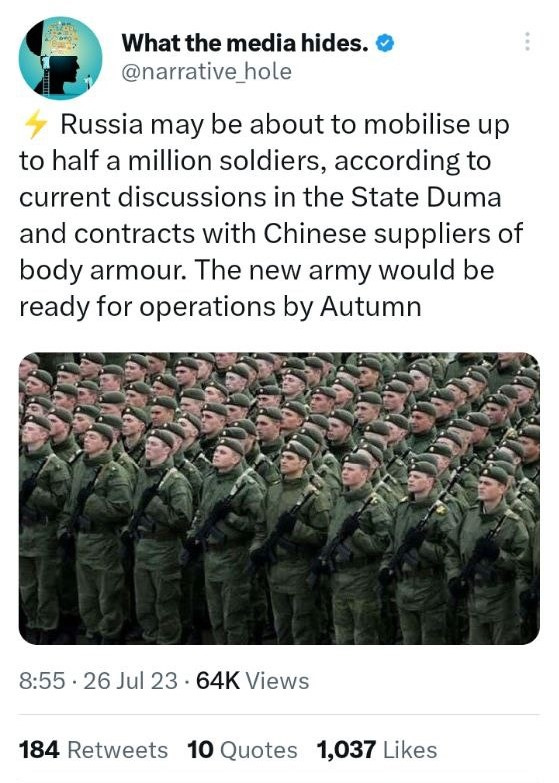

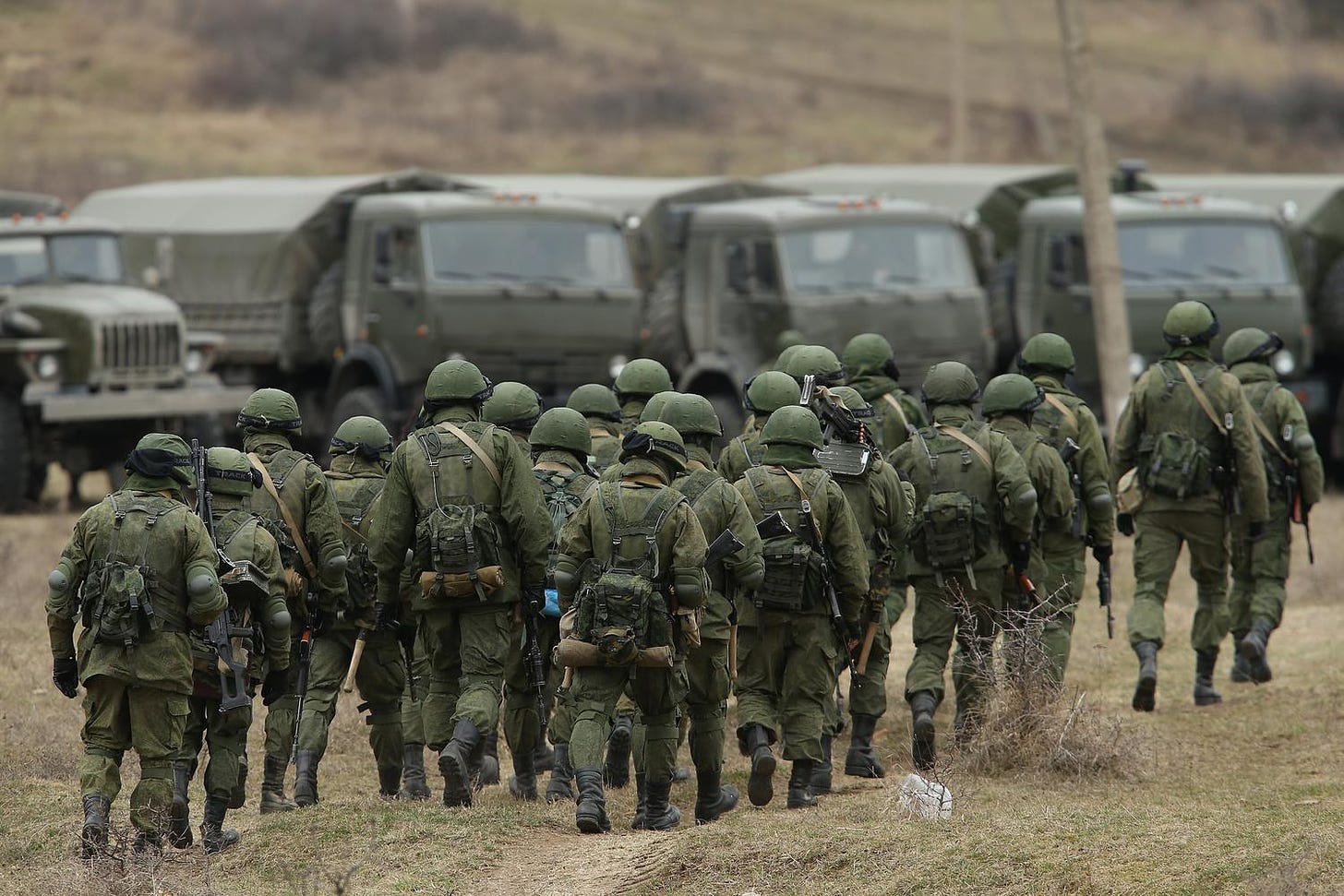
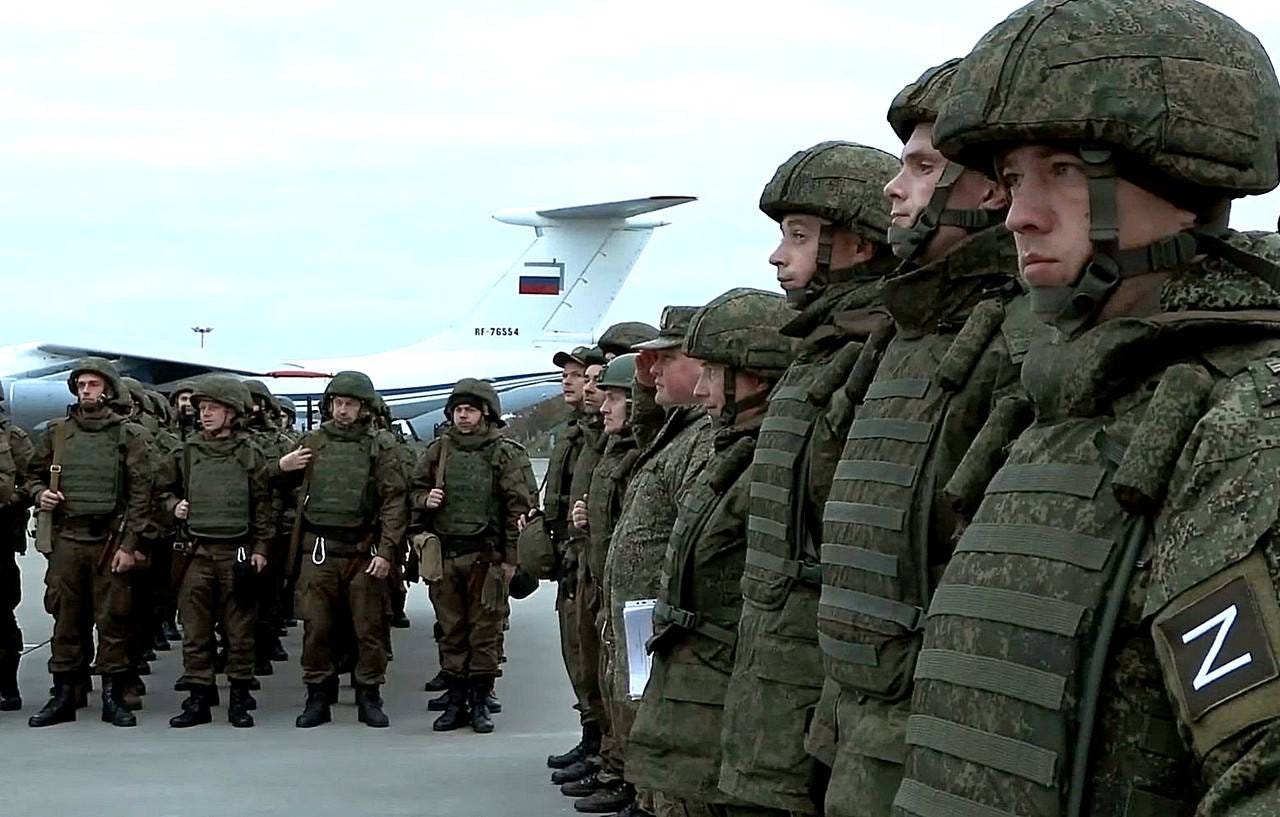

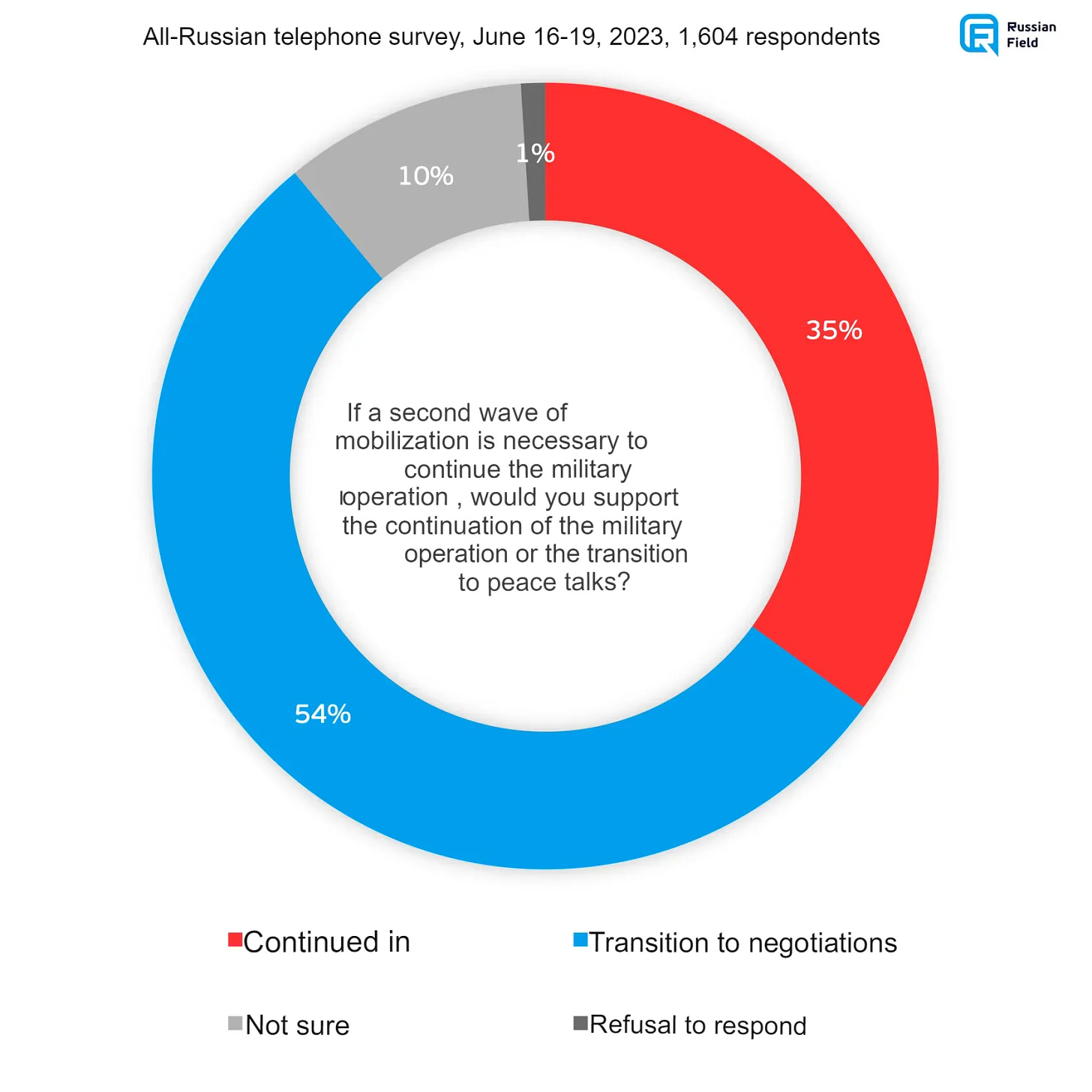





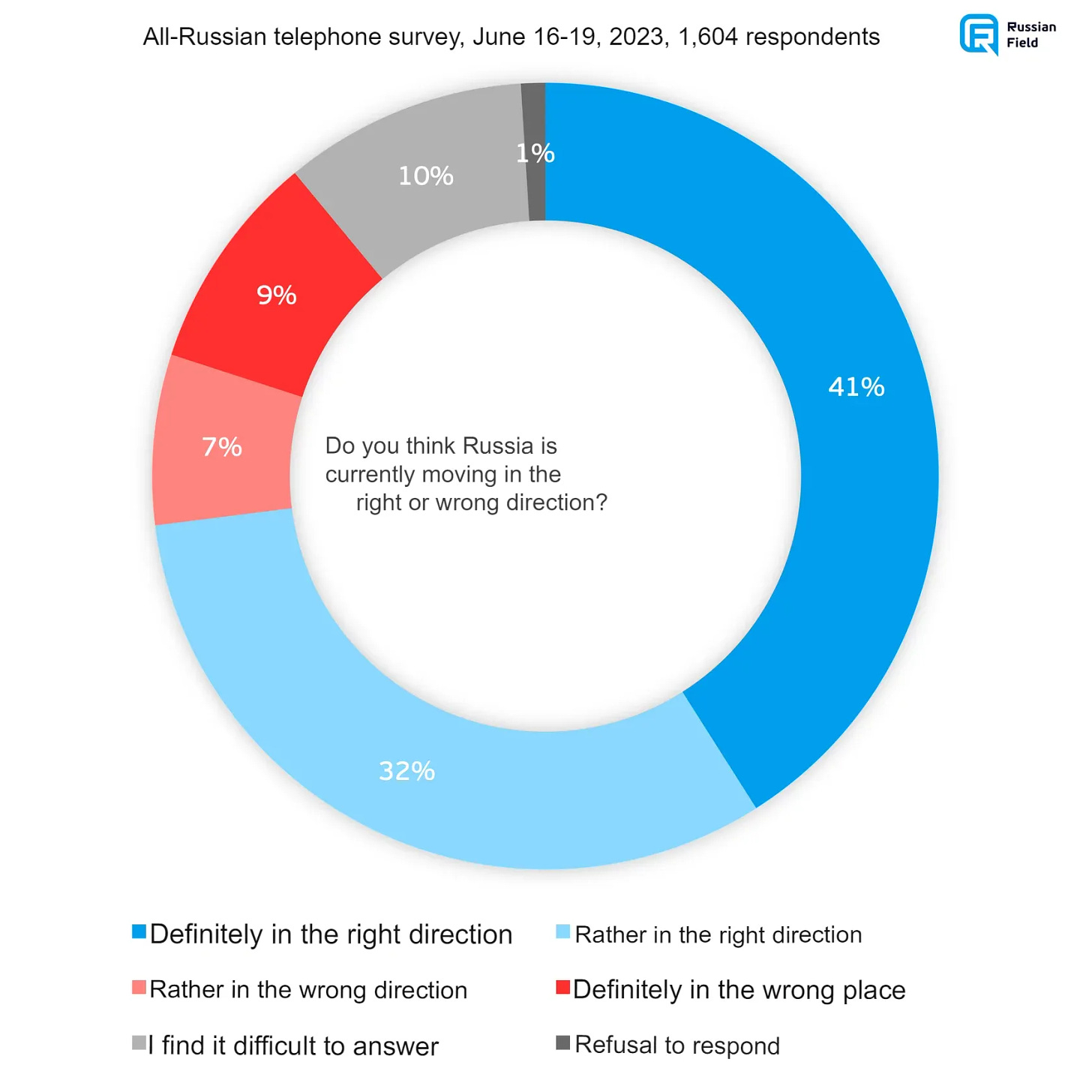
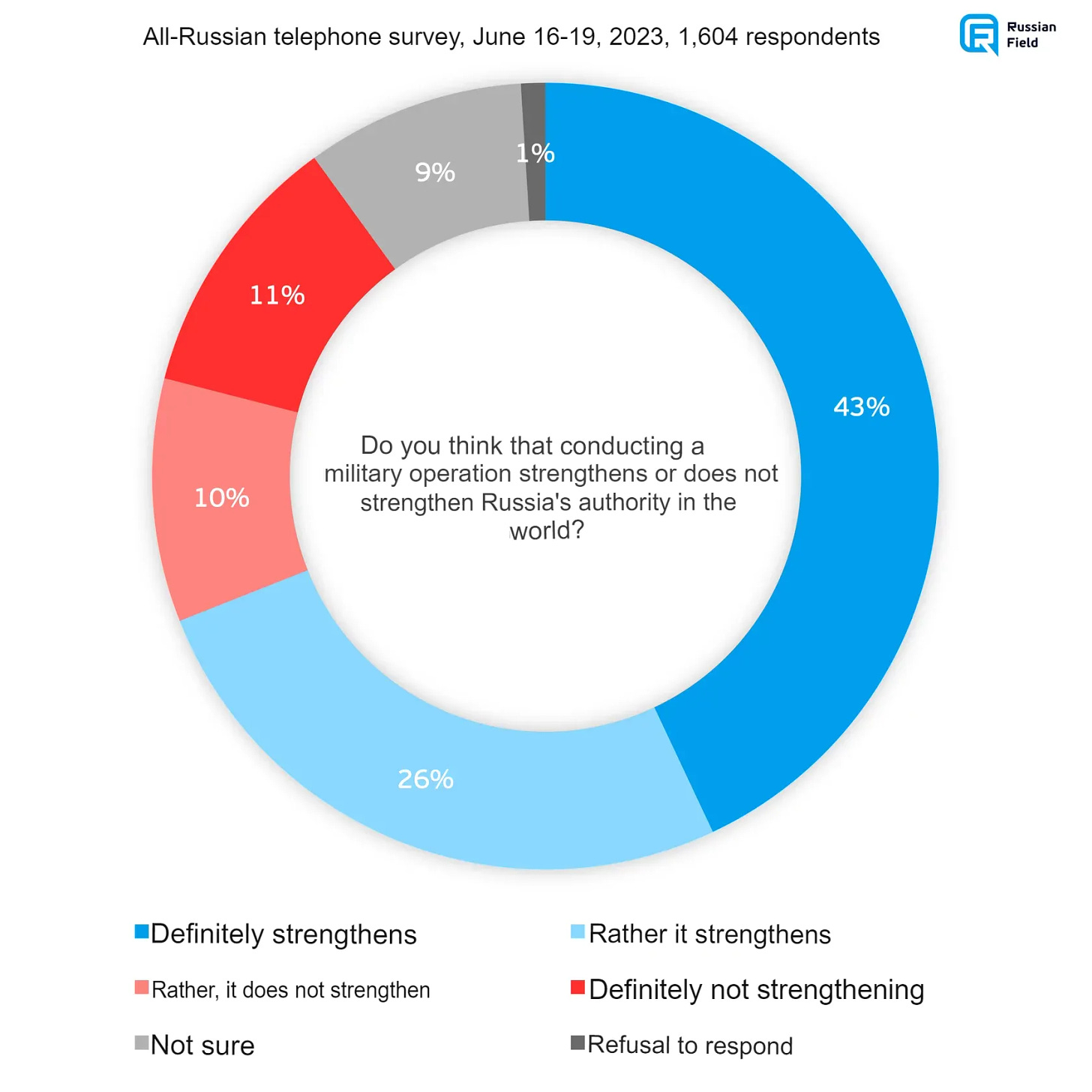

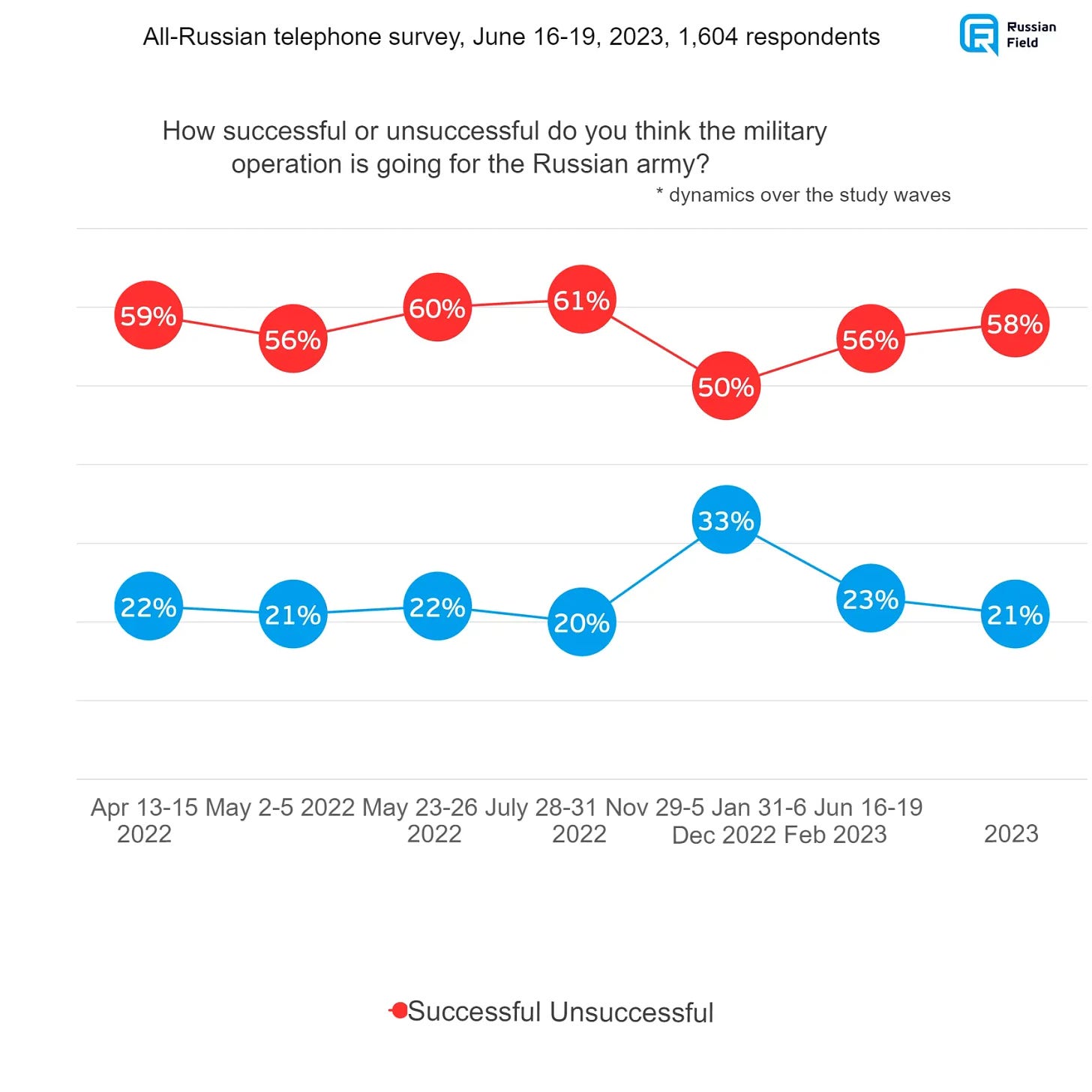
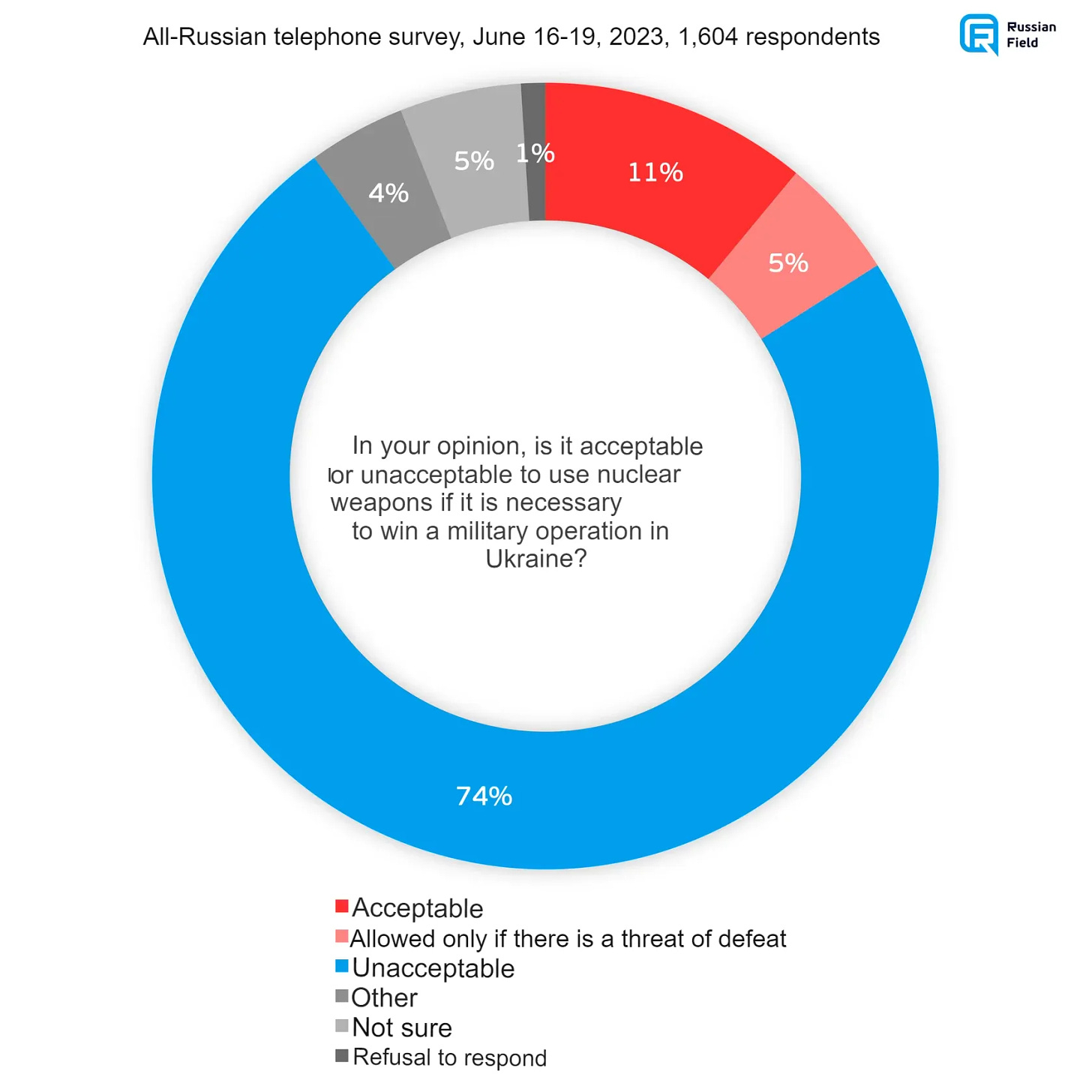
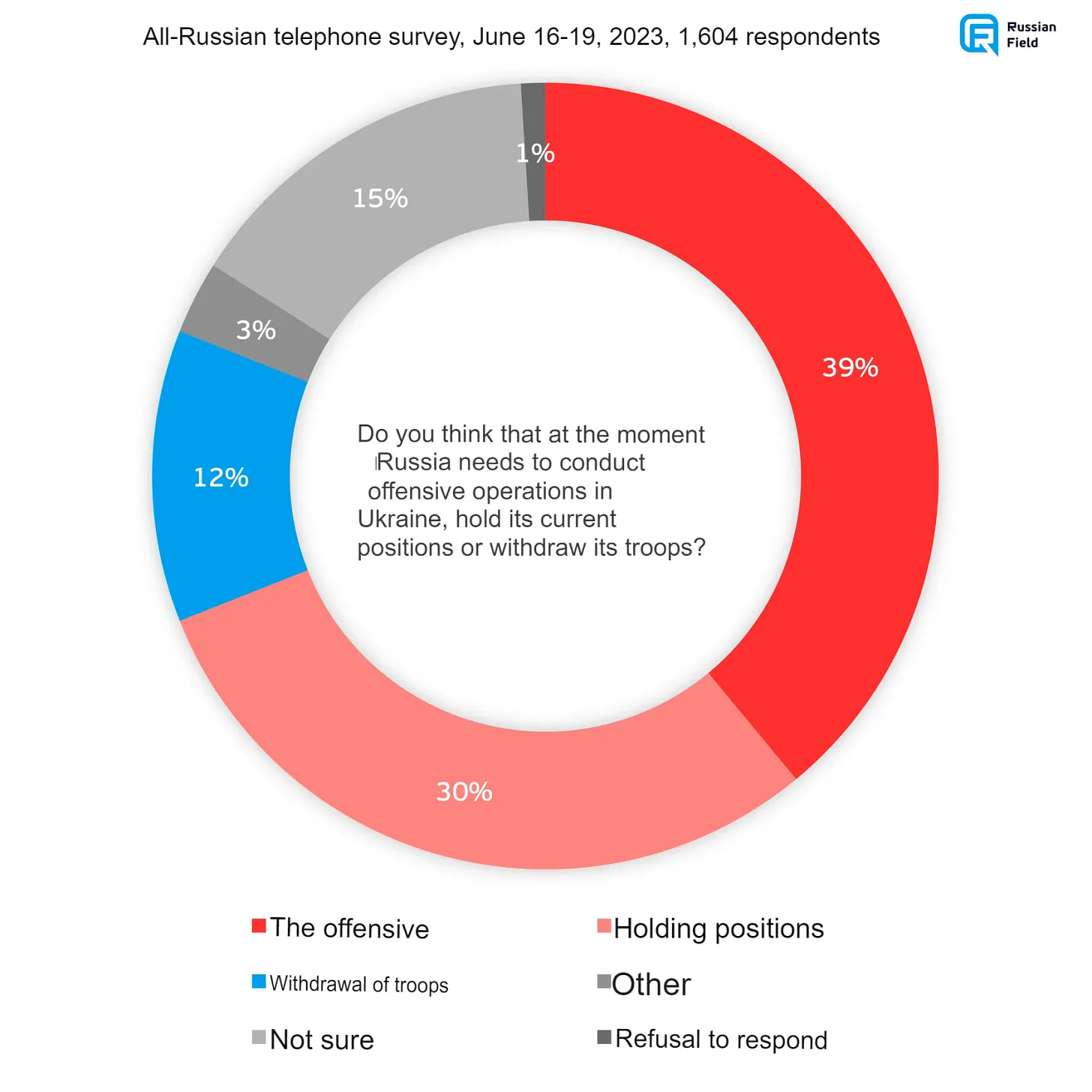
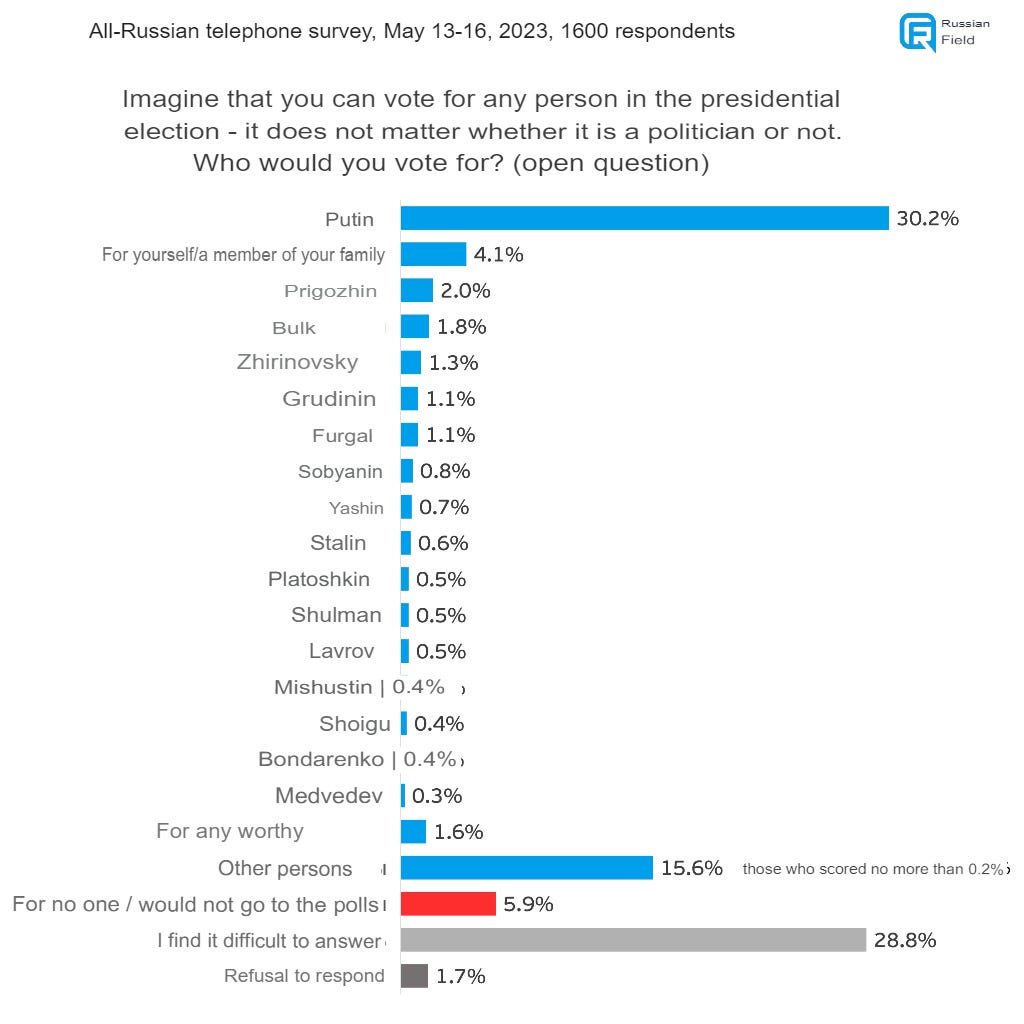

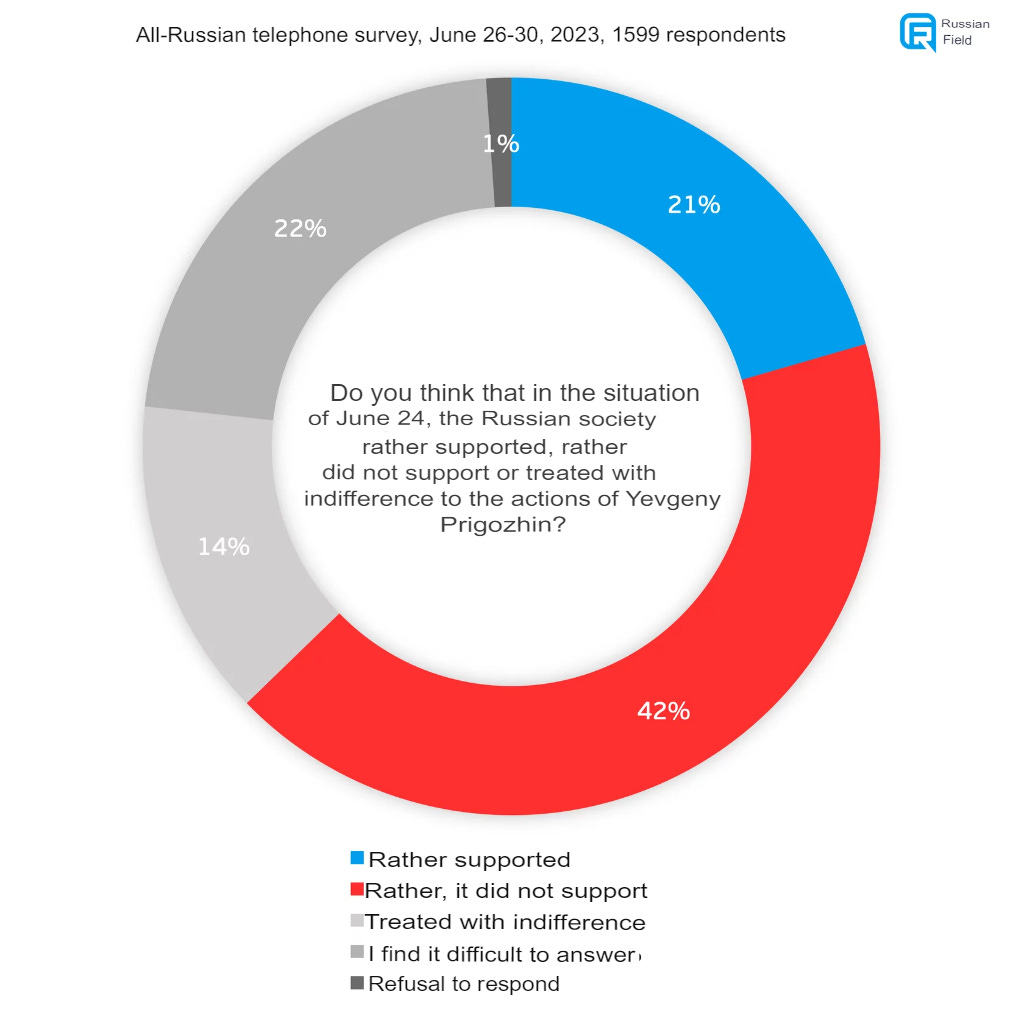


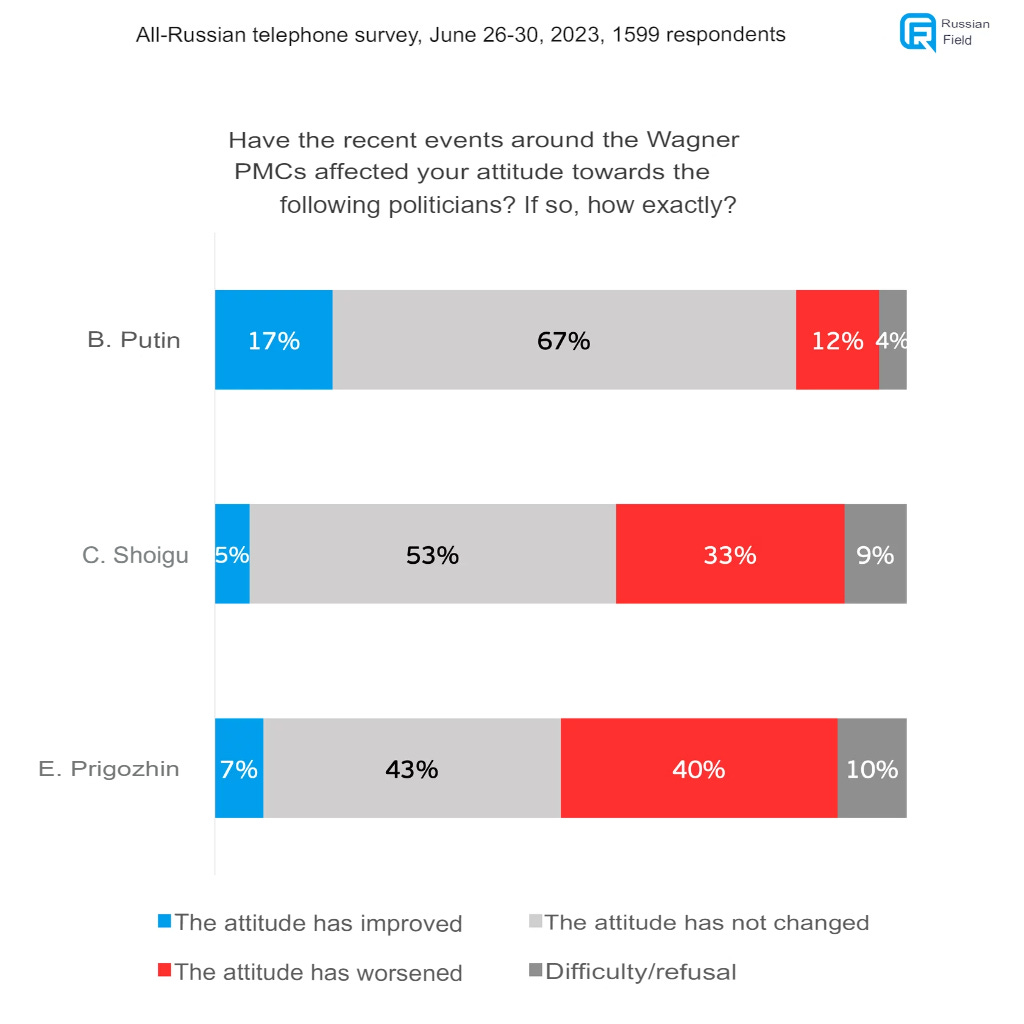
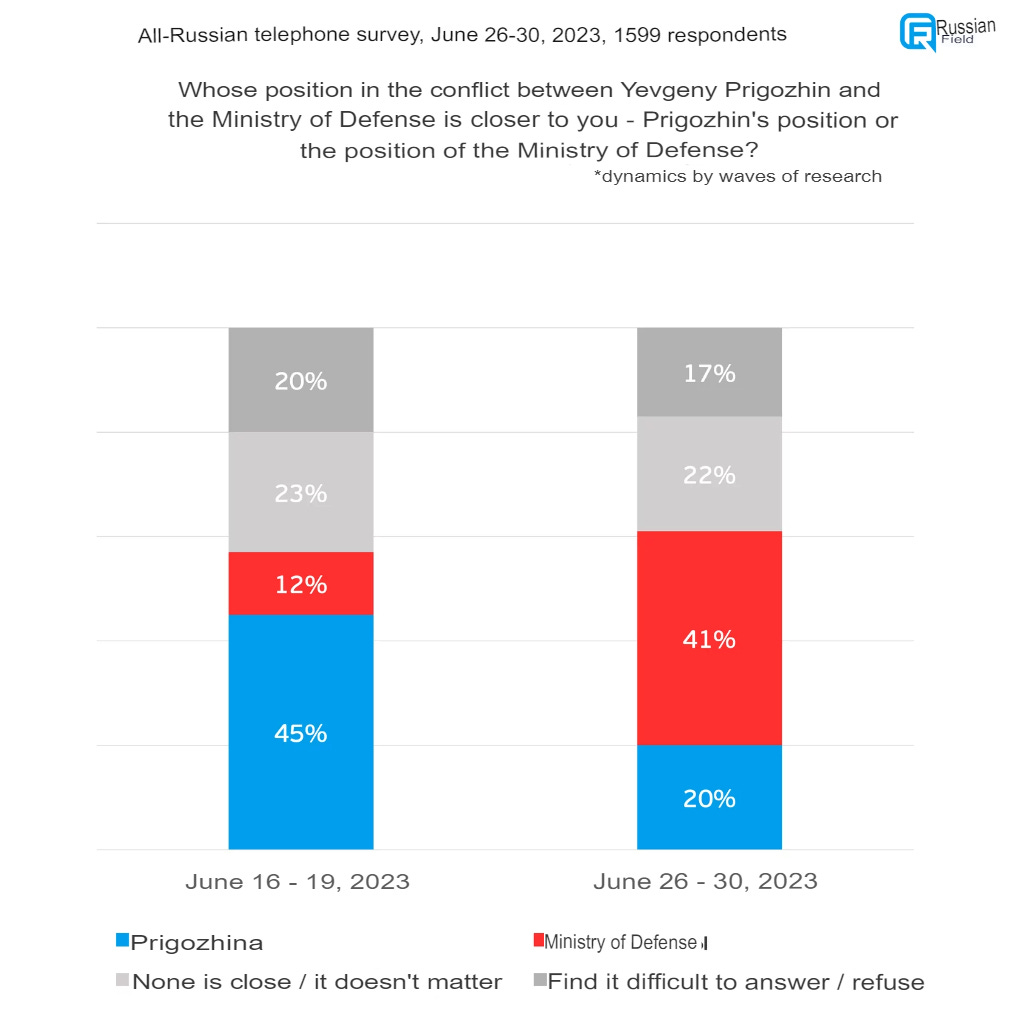

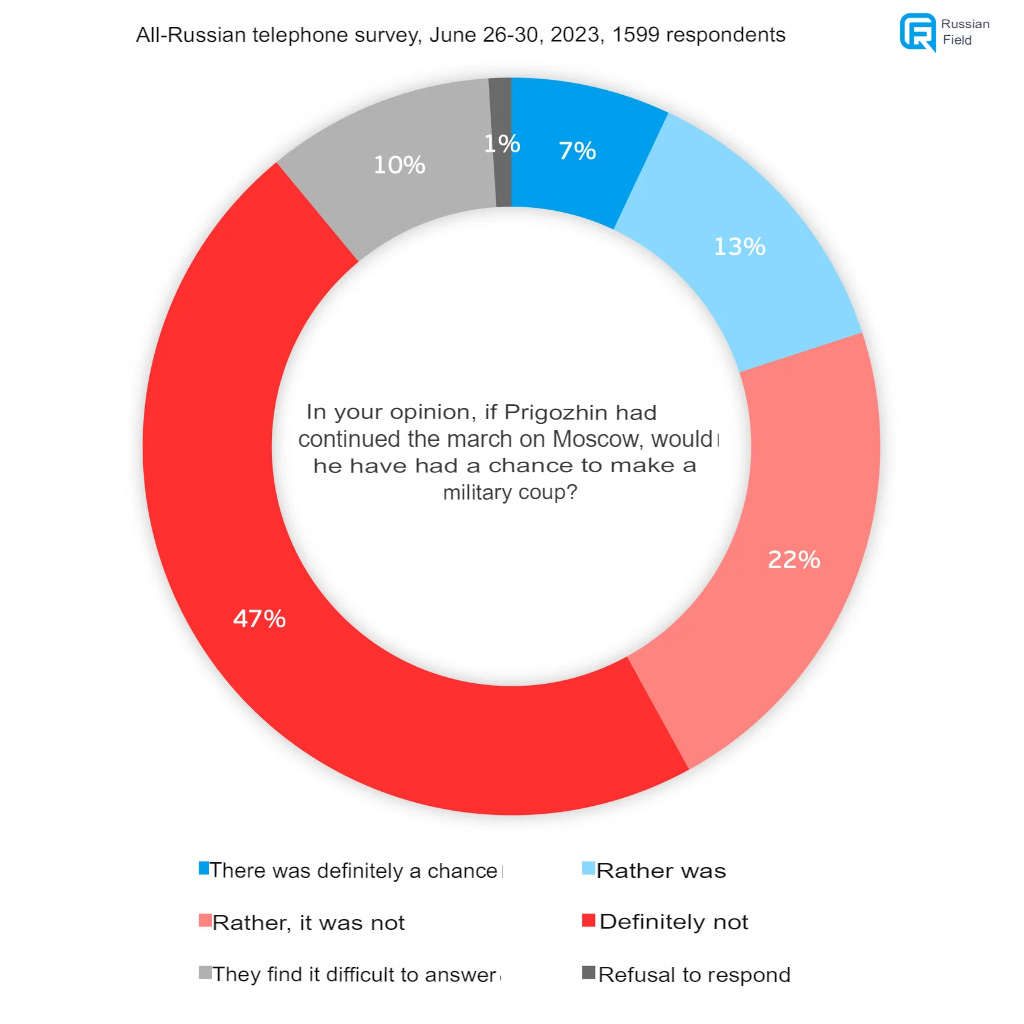

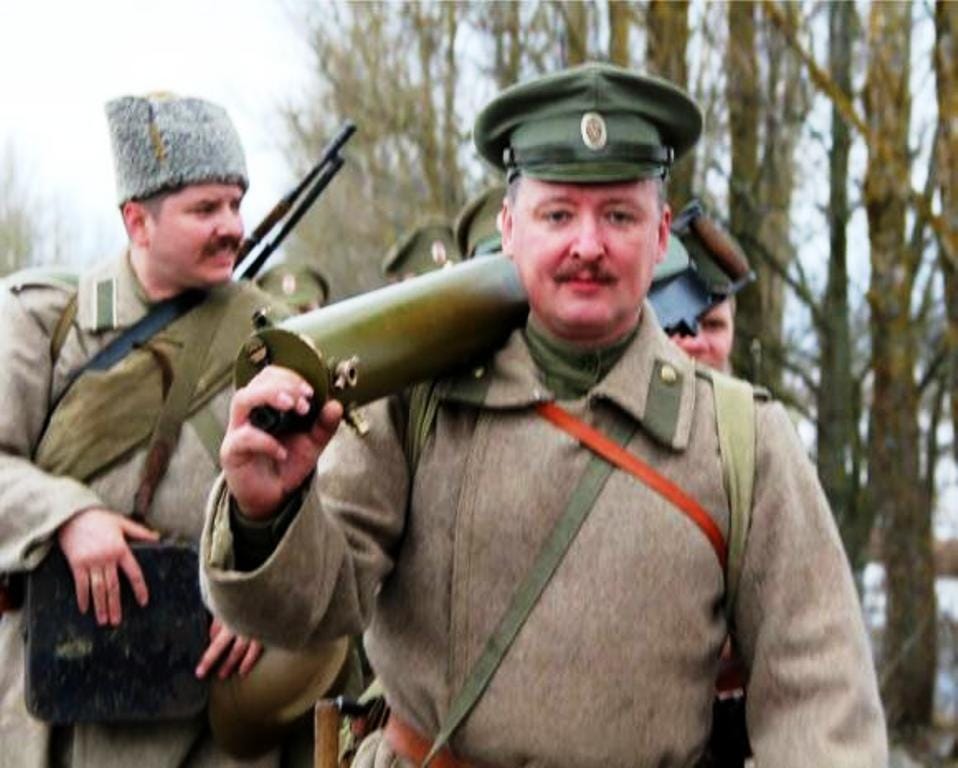
Would love to see a list of the most delusional bloodthirsty GAE/NATO warmongers and some kind of debate between you and them. Mick Ryan of Futura Doctrina Substack has some nutty takes. Adam Kinzinger, Lindsay Graham, Alexander Vindman, Victoria Nuland, Tony Blinken, Jake Sullivan, and the big guy are up there too.
That first video, regarding Andrey Kartapolov, was interesting. The poll graphs more so. It makes sense to create deterrence, it's also the art of negotiation, and, if there's no war, it furthers nationalism which Russia needs as a tool to overcome its citizens' loss of their relationship with Europe.